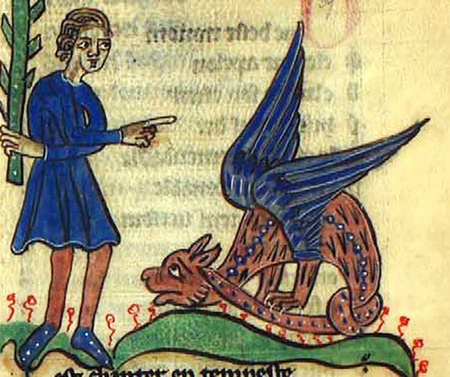I was looking for a fun little anecdote about open research for National Appreciate a Dragon Day (I’m sure you all have that on your calendars – 16 January) when I stumbled upon a pretty fascinating story about the benefits of open culture and dragons…..and dungeons even.
Hearken ye to my tale that begins way back in the forgotten age of 2000. It was a new millennium and the Open Source movement was making waves in the software world when the head of Wizards of the Coast decided they should release their next edition (3rd edition) of the Dungeons and Dragons manual on an open licence. This license would allow free re-use of the basic mechanics of the game on the basis that all derivatives would be shared on the same licence (very similar to the Creative Commons BY-SA license), and was called the Open Game Licence. The artwork, characters, settings, and stories from the manual as well as the official campaign books were still ‘all rights reserved’ but the games mechanics, as well as the classes, races, spells, and monsters that made the game work as a game were free for anyone to use. These openly licensed elements were compiled into a separate document known as the System Reference Document (SRD).
This led to an explosion of creativity in the creation of derivative works, ranging from similar role playing games such as Pathfinder, video games using the mechanics, fan art and merchandise, at least one Pixar movie, to eventually podcasts and web series such as Critical Role and The Adventure Zone where people played the game for an audience. This explosion of related material dramatically increased the popularity and knowledge of Dungeons and Dragons itself, to the point where last year it was the inspiration for a major blockbuster film (which used content not covered by the Open Game License, and was thus hugely profitable for Wizards of the Coast).
However, this peace in the Kingdom was not to last, as 4th Edition was released on a much more restrictive license, not fully closed but barely open. The previous material was unaffected and most fans continued using 3rd edition with no interruption to any derivative projects they may have been involved in. Of course, many players will tell you there were a number of reasons 4th edition was unpopular, but the restrictive license was a factor, and it prevented creators from making fan works that may have smoothed over some of those issues and boosted popularity despite it's perceived flaws.
They seemed to learn their lesson however, and 5th edition was back to the Open Game License, a newer version, but not more restrictive in any significant way. They even added a transparent licensing fee structure for the content outside the SRD so creators could easily make their own spin-offs on terms that the community generally regarded as fair. Many of the popular forms of fan content such as play through podcasts were released in this era.
But alas, they hadn't actually learnt their lesson, and initially planned to release the replacement for 5th Edition, DND One, on a license that would not only restrict derivative works, but force creators to share a significant amount of profit with Wizards of the Coast (now owned by Hasbro). They were also proposing revoking the Open Game License on previous editions. This would not only limit future work, but potentially make all those previous works in violation of copyright and subject to Cease and Desist orders, destroying many businesses and artworks.
Great was the devastation in the land! And with much wailing and gnashing of teeth did the gamers take to social media. Eventually the Wizards had no choice but to reverse their proposed changes. They converted the license on the SRD for 5th edition to a Creative Commons Attribution license (CC BY 4.0), which unlike the OGL, they can not revoke once it has been applied. As the SDR for 5th edition included within it all the material in 3rd edition, effectively everything was now under a CC BY licence in perpetuity, and Wizards of the Coast promised to release all future editions under the same terms. Etsy’s Gelatinous Cube plushies were saved!
But why should you care, you may be thinking? Well, this is a story about how by choosing to be open you can dramatically expand the reach and impact of your work. It’s almost certain that hundreds of millions of people wouldn’t have watched Chris Pine play the lute if Critical Role and their ilk had never existed, and while I can’t guarantee lute-playing heart-throbs will act out your research on colon disease, the same principle still applies. By allowing people to freely share and use your work, you magnify the impact it can have. The more we can share and build on each other’s work, the richer a world we can create, whether that’s funny dragon movies or life-saving medical research. When we share openly, we allow people to create work we could never have imagined.


